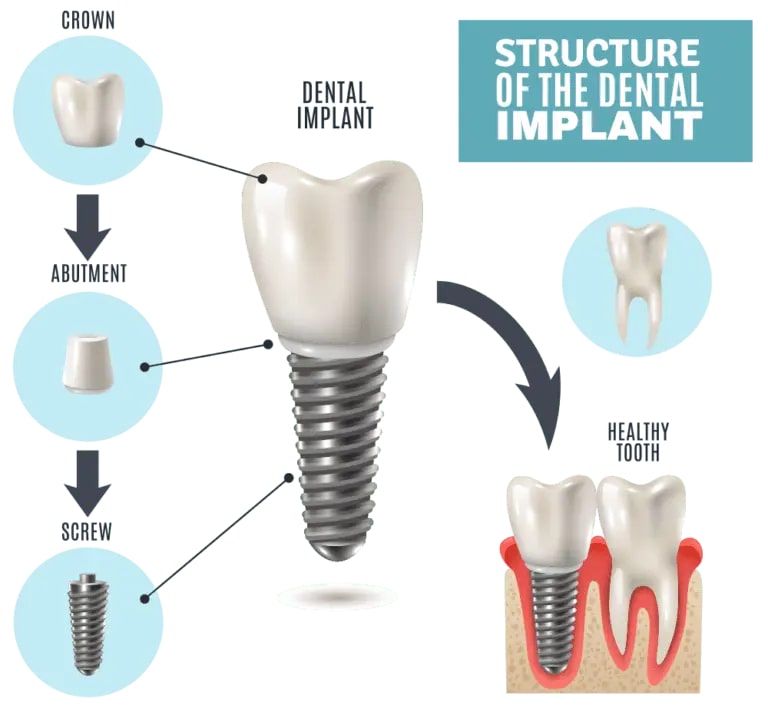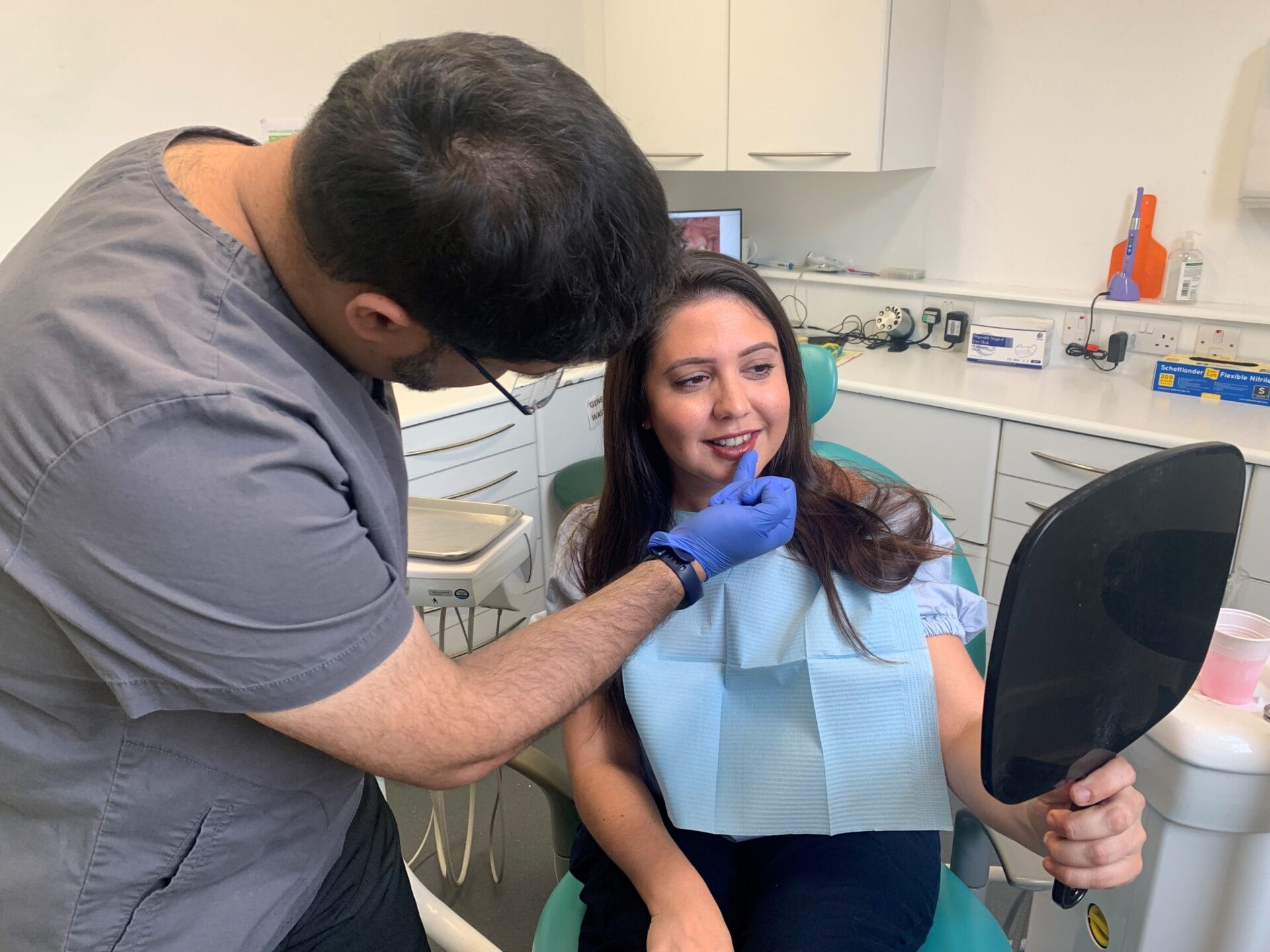
Get a Long-term Solution to Missing Out On Teeth With Oral Implants
In today's globe, improvements in dental modern technology have actually made it possible to address the issue of missing out on teeth with a durable solution: dental implants. These ingenious prosthetics have reinvented the field of corrective dentistry, offering an irreversible solution that carefully resembles all-natural teeth. The advantages of dental implants go beyond simple appearances. Comprehending just how they work, the excellent candidates for this treatment, and the ins and outs of the implant placement procedure can supply important insights right into why they are considered the gold standard in tooth substitute.
Advantages of Dental Implants
Dental implants provide a effective and long-term solution for bring back missing teeth, providing various benefits for patients looking for lasting dental wellness and practical enhancement. Unlike typical dentures or bridges, which may need substitute or modifications over time, dental implants are created to last a lifetime with correct care.
Additionally, dental implants offer enhanced visual appeals and capability compared to various other tooth replacement alternatives. They look like all-natural teeth, enhancing the person's smile and self-esteem. Furthermore, oral implants bring back correct chewing capability, allowing individuals to appreciate their preferred foods without constraints. This repair of oral function can have a favorable effect on total health and wellness by sustaining proper nourishment and digestion.

How Dental Implants Work
Making use of advanced surgical techniques and materials, the process of incorporating oral implants right into the jawbone entails specific positioning and osseointegration to develop a secure foundation for prosthetic teeth. Dental implants include three main components: the implant fixture, abutment, and prosthetic crown. The dental implant component, normally made of titanium, is surgically put into the jawbone where the missing tooth when was. Over a period of several months, the bone merges with the implant in a process called osseointegration, making sure a strong and resilient support for the replacement tooth.
When the osseointegration is total, an abutment is affixed to the dental implant fixture. The abutment works as a connector between the implant and the prosthetic crown. Ultimately, the prosthetic crown, personalized to match the color and shape of the bordering teeth, is safely attached to the joint, completing the oral implant repair. This procedure leads to a natural-looking and functional tooth replacement that can last a life time with proper treatment and maintenance.
Candidates for Oral Implants
Having comprehended how oral implants feature and the precise procedure of integrating them into the jawbone, it is essential to determine ideal candidates who can profit from this permanent tooth substitute remedy. Ideal prospects for oral implants are individuals with great dental and overall health and wellness, appropriate bone density in the jaw to support the dental implant, and healthy and balanced gum tissues. It is critical for candidates to have a commitment to preserving superb oral hygiene methods post-implant positioning to ensure the durability of the implants.


Individuals who smoke or have specific medical conditions like uncontrolled diabetes or like this heart problem may not appropriate prospects for oral implants. Furthermore, individuals who have undertaken radiation treatment to the head and neck region or are taking medications that can affect the recovery procedure may also not be ideal prospects for this treatment.
Consulting with a qualified dental implant professional is important to determine if you are an ideal candidate for dental implants and to discuss any kind of possible dangers or issues based on your specific health and wellness status. (Dental implants Kent)
Implant Positioning Process
The process of placing oral implants includes a series of specific actions to guarantee effective combination and long-term security within the jawbone. The dental practitioner assesses the person's oral health via assessments and imaging scans to figure out the suitability for implants. The following action involves operatively positioning the implant into the jawbone if the person is deemed a great prospect. This procedure is normally done under local anesthesia to lessen pain.
When the dental implant is positioned, a duration of recovery, called osseointegration, begins. During this phase, which can last a number of months, the jawbone merges with the dental implant, supplying a solid structure for the fabricated tooth. After osseointegration is full, a joint is connected to the dental implant to connect the permanent crown. The final step involves customizing and attaching the crown to the abutment, restoring function and looks to the person's smile. Normal follow-up consultations are important to monitor the implant's stability and guarantee long-lasting success.
Long-Term Success of Implants
With effective osseointegration developed and the crown firmly in location, the focus changes to ensuring the long life and security of oral implants for continual oral health and wellness. Long-term success of implants hinges on various elements, consisting of proper oral hygiene upkeep, regular dental examinations, visit and way of life behaviors.
Keeping good oral hygiene is essential for the longevity of oral implants. Cleaning at the very least twice a day, flossing daily, and using antimicrobial mouth wash can help avoid gum tissue illness and peri-implantitis, which prevail reasons for implant failing.
Normal oral check-ups are vital to check the wellness of the implants and surrounding cells - Dental implants Kent. These gos to enable the dental practitioner to identify any type of issues early and address them prior to they intensify, making sure the implants remain secure and functional for many years to find
Additionally, way of life routines such as preventing cigarette smoking and too much alcohol usage can dramatically affect the long-lasting success of dental implants. Smoking, specifically, can hinder the healing process and enhance the danger of dental implant failing. By complying with these standards and keeping a healthy and balanced way of living, people can maximize the longevity and success of their dental implants.
Conclusion
In conclusion, dental implants offer a long-term service for missing teeth. They offer various benefits, such as improved aesthetic appeals, function, and overall quality of life. The implant positioning procedure includes surgically inserting a titanium post right into the jawbone, which after that integrates with the bone to produce a steady foundation for a prosthetic tooth. With correct treatment and upkeep, oral implants can have lasting success and bring back a natural-looking smile.
In today's world, advancements in oral modern technology have made it possible to resolve the problem of missing teeth with a durable option: dental implants.Oral implants supply a reliable and long-term solution for recovering missing teeth, providing countless benefits for patients looking for long-term dental health and useful enhancement. Dental implants are composed of 3 primary components: the dental implant fixture, joint, and prosthetic crown.Having comprehended how oral implants feature and the careful check my site process of integrating them right into the jawbone, it is vital to identify appropriate prospects who can profit from this permanent tooth replacement remedy. Suitable prospects for dental implants are individuals with excellent oral and general health, appropriate bone thickness in the jaw to support the implant, and healthy and balanced gum cells.